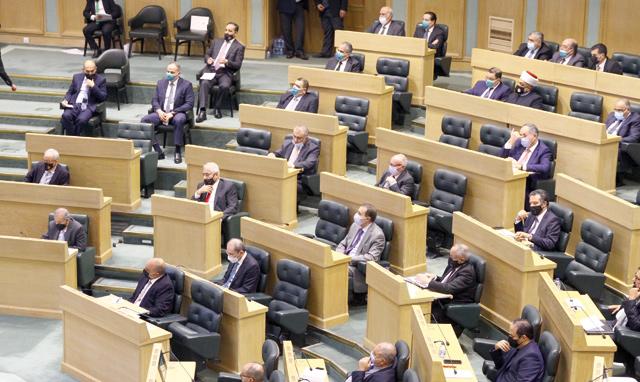- Local News
- Web-2021-01-06 | 05:54 pm

Nayrouz News Agency : The Lower House on Tuesday embarked on deliberations over the government’s policy statement, which Prime Minister and Minister of Defence Bisher Al Khasawneh presented to the Chamber on Sunday.
Under the Constitution, the Cabinet that is formed while the Parliament is dissolved shall present its policy statement within one month of the inauguration of the newly elected Lower House.
The House decided earlier to allocate 20 minutes to each deputy and 30 minutes to each bloc to address the government's policy statement.
MP Ahmad Asha referred to the national and regional exceptional circumstances that impose "very dangerous” political, economic, security and social repercussions that require preparing programmes and plans based on scientific foundations with the participation of the Chamber, the Jordan News Agency, Petra, reported.
Asha also voiced support to His Majesty King Abdullah’s stance that rejects any changes to the status quo in Jerusalem and allegiance to the Hashemite custodianship over Islamic and Christian holy sites in the city, in addition to supporting the Palestinian people in establishing their independent state with East Jerusalem as their capital and the right to return.
Lawmaker Abdulsalam Thiabat said that the government and Lower House are at an "unenviable juncture”, where the homeland’s strongest enemy is poverty and hunger, where Jordanians feel despair and lack of hope, which requires reforms to stand again through action and execution.
Deputy Khalid Bustanji said that the government’s policy statement lacked plans and programmes, where the government has to admit that it presented a set of "intentions” that cannot be judged in terms of actual ability to be partially or fully realised without stating what resources they need.
As for the COVID-19 pandemic, Bustanji referred to the shortages of medical staff and equipment, in addition to high debts of hospitals and the economic crisis, wondering if the government has a monetary programme to provide the liquidity necessary or if it will resort to "citizens’ pockets”.
MP Khaldoun Hina called on the government to cancel all forms of partial and full lockdown that are no longer convincing in a country that is gradually controlling the pandemic, especially that poverty, unemployment and hunger rates have soared nationwide.
Deputy Yanal Freihat called for the immediate halt of distance education and preparing a clear mechanism, regardless the epidemiological conditions, for the return of students to their schools and universities and compensate them for what he described as "distancing from education”.
Other MPs called for adopting programmes to stimulate the economic sectors facing the danger of closure and compensating the affected institutions, moving forward in the political reforms, revising the Income and Sales Tax Law, fighting corruption and supporting the agricultural, educational and health sectors, among other demands.









